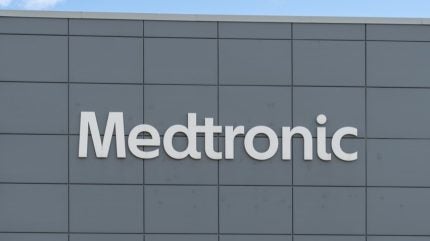
Medtronic has published preliminary data from a study of its adaptive deep brain stimulation (aDBS) device, Percept PC neurostimulator, in patients living with Parkinson’s disease.
The adaptive DBS algorithm for personalised therapy in Parkinson’s disease (ADAPT-PD) trial (NCT04547712) is designed to demonstrate the safety and effectiveness of aDBS for Parkinson’s. Medtronic has filed for US approval of aDBS with data from the study expected to support the device’s global regulatory filing.

Discover B2B Marketing That Performs
Combine business intelligence and editorial excellence to reach engaged professionals across 36 leading media platforms.
DBS is used to treat motor symptoms, such as tremors, bradykinesia and rigidity, in patients with Parkinson’s disease. The Percept PC DBS system was initially cleared by the US Food and Drug Administration (FDA) to deliver continuous DBS (cDBS) in 2020.
Adaptive DBS therapy is a personalised DBS therapy, where directional leads deliver the right amount of stimulation when it is needed rather than a continuous DBS delivery. Therefore, aDBS can provide stable symptom control by delivering stimulation and make changes based on a patient’s brain state and in combination with medications.
The trial design and preliminary data were published in a Nature journal, npj Parkinson’s Disease. The study enrolled 68 participants who were implanted with either subthalamic nucleus (STN) or globus pallidus internus (GPi) DBS connected to a Percept PC neurostimulator, 15 of these did not make it past the enrolment phase either due to screen failure, withdrawal, or a clinician decision.
The study was launched in 2021 and is designed to evaluate aDBS use in ‘at-home’ settings. The trial’s primary endpoint will compare standard cDBS to aDBS for hours of ‘On’ time without troublesome dyskinesias, a measure of treatment efficacy versus side effects, as reported by the patient diary.

US Tariffs are shifting - will you react or anticipate?
Don’t let policy changes catch you off guard. Stay proactive with real-time data and expert analysis.
By GlobalDataA local field potential (LFP) signal sufficient for aDBS programming was present in 84% of patients, regardless of PD clinical subtype, with similar detection rates between STN and GPi. Whether a patient took medication had a relatively small impact on LFP detection rates, with a 6.7% higher detection rate off medication.
The global market for neuromodulation devices was worth approximately $6.06bn in 2023 and is expected to reach over $8.9bn in 2027, as per GlobalData market analysis. The deep brain stimulation device market segment is forecast to constitute $1.9bn of the market by 2030.
GlobalData is the parent company of Clinical Trials Arena.
Although being first developed for the treatment of depression, neuromodulation devices are being developed to treat a variety of neurological disorders. In October 2023, Neurovalens’s neurostimulation device, Modius Sleep, received 510(k) clearance from the US Food and Drug Administration (FDA) to treat chronic insomnia. In August 2023, Dutch startup Salvia BioElectronics treated the first patient using its implantable neurostimulation system for treating severe migraine and cluster headaches.
Nexalin is also investigating the use of deep brain stimulation devices in Alzheimer’s and dementia. In March, the company also reported positive data from a clinical trial showing that its neurostimulation device can help alleviate symptoms of combat-related mild traumatic brain injury (mTBI) in veteran patients.





